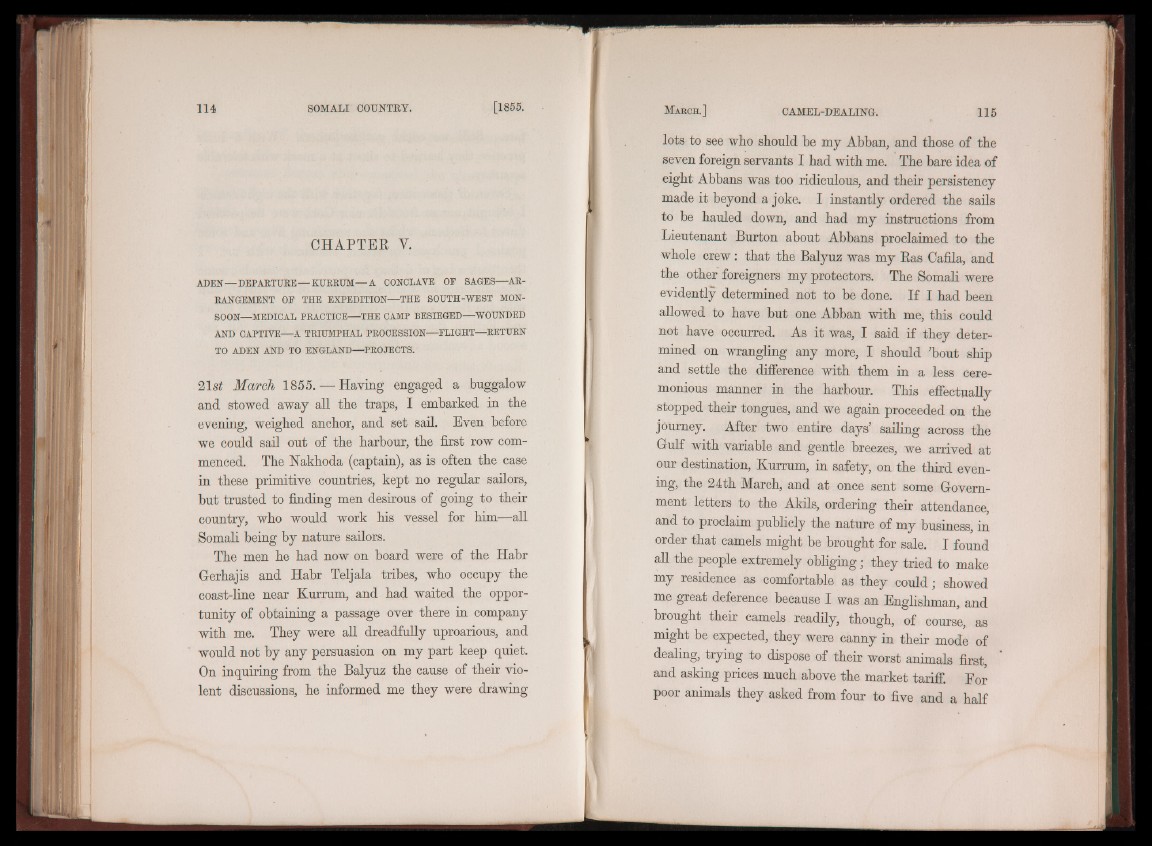
CHAPTER Y.
ADEN— DEPARTURE— KURRUM— A CONCLAVE OF SAGES—ARRANGEMENT
OF THE EXPEDITION— THE SOUTH-WEST MONSOON—
MEDICAL PRACTICE— THE CAMP BESIEGED—WOUNDED
AND CAPTIVE— A TRIUMPHAL PROCESSION— FLIGHT—RETURN
TO ADEN AND TO ENGLAND—PROJECTS.
21 si March 1855. — Haying engaged a buggalow
and stowed away all the traps, I embarked in the
evening, weighed anchor, and set sail. Even before
we could sail out of the harbour, the first row commenced.
The Nakhoda (captain), as is often the case
in these primitive countries, kept no regular sailors,
but trusted to finding men desirous of going to their
country, who would work his vessel for him—all
Somali being by nature sailors.
The men he had now on board were of the Habr
Gerhajis and Habr Teljala tribes, who occupy the
coast-line near Kurrum, and had waited the opportunity
of obtaining a passage over there in company
with me. They were all dreadfully uproarious, and
would not by any persuasion on my part keep quiet.
On inquiring from the Balyuz the cause of their violent
discussions, he informed me they were drawing
lots to see who should be my Abban, and those of the
seven foreign servants I had with me. The bare idea of
eight Abbans was too ridiculous, and their persistency
made it beyond a joke. I instantly ordered the sails
to be hauled down, and had my instructions from
Lieutenant Burton about Abbans proclaimed to the
whole crew: that the Balyuz was my Bas Cafila, and
the other foreigners my protectors. The Somali were
evidently determined not to be done. If I had been
allowed to have but one Abban with me, this could
not have occurred. As it was, I said if they determined
on wrangling any more, I should ’bout ship
and settle the difference with them in a less ceremonious
manner in the harbour. This effectually
stopped their tongues, and we again proceeded on the
journey. After two entire days’ sailing across the
Gulf with variable and gentle breezes, we arrived at
our destination, Kurrum, in safety, on the third even-
ing, the 24 th March, and at once sent some Government
letters to the Akils, ordering their attendance,
and to proclaim publicly the nature of my business, in
order that camels might be brought for sale. I found
afi the people extremely obliging; they tried to make
my residence as comfortable as they could; showed
me great deference because I was an Englishman, and
brought their camels readily, though, of course, as
might be expected, they were canny in their mode of
dealing, trying to dispose of their worst animals first,
and asking prices much above the market tariff. For
poor animals they asked from four to five and a half